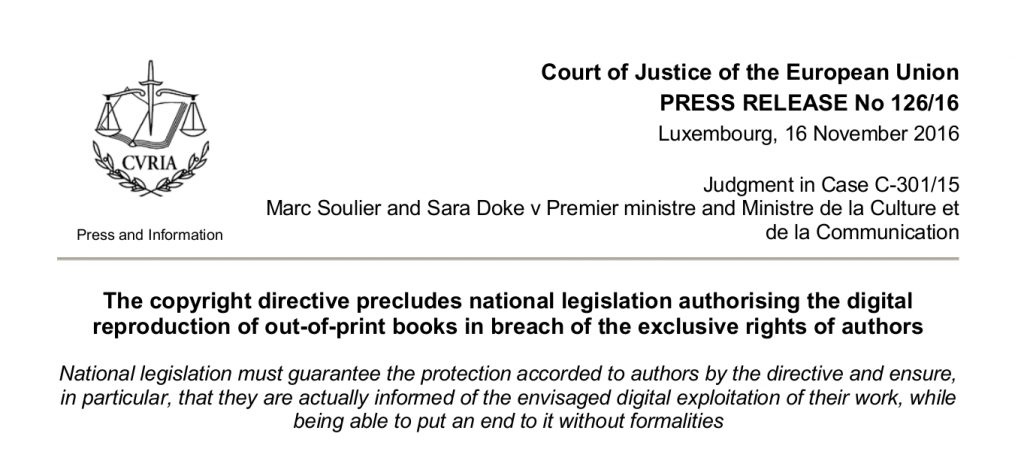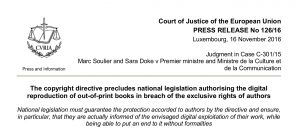
 Acting on a lawsuit brought by French freelance authors and supported by the NWU, the European Union’s Court of Justice has ruled that the French law permitting distribution of digital copies of books deemed “out of commerce,” without the consent of the authors, violates their rights and is invalid.
Acting on a lawsuit brought by French freelance authors and supported by the NWU, the European Union’s Court of Justice has ruled that the French law permitting distribution of digital copies of books deemed “out of commerce,” without the consent of the authors, violates their rights and is invalid.
We think the court was correct to find that there was no real “consent,” because many authors did not know that their work would be included in this scheme.
Of course, this is especially likely for foreign writers. Many books published in the US by multinational publishers are simultaneously published in Europe. (How many books from major publishers list the place of publication on the title page as, “New York and London?”) Almost all major “cloud” platforms for Web publishing have servers in the European Union, as well as in the US and often elsewhere.
Some NWU members Stateside, including the famous science fiction writer Ursula K. Le Guin, found that their work: (a) was published or distributed in France without their knowledge, under contracts permitting sublicensing, often under different (translated) titles, and (b) was determined to be “out of print” in France based solely on (inadequate and cursory) searches of “Books in Print” and similar catalogs of publisher data.
In many instances, these “out of print” works are actually available on authors’ websites, or in new self-published digital editions.
The European court relied for its decision not just on European law but also on the Berne Convention and WIPO Copyright Treaties, to which the US is also a party.
In its decision, the European court found two violations of authors’ rights in the French law.
First, they found that the law deprived authors of their right to control the copying and distribution of their work. Although authors were given a nominal option to choose whether to participate in collective licensing of works that were included in “out of commerce” books, the court found that inadequate:
[E]very author must actually be informed of the future use of his work by a third party, and the means at his disposal to prohibit it if he so wishes.
Failing any actual prior information relating to that future use, the author is unable to adopt a position on it and, therefore, to prohibit it, if necessary, so that the very existence of his implicit consent appears purely hypothetical in that regard.
Consequently, without guarantees ensuring that authors are actually informed as to the envisaged use of their works and the means at their disposal to prohibit it, it is de facto impossible for them to adopt any position whatsoever as to such use….
[I]t is not inconceivable that some of the authors concerned are not, in reality, even aware of the envisaged use of their works and, therefore, that they are not able to adopt a position, one way or the other, on it. In those circumstances, a mere lack of opposition on their part cannot be regarded as the expression of their implicit consent to that use.
This is all the more true considering that such legislation is aimed at books which, while having been published and commercially distributed in the past, are so no longer. That particular context precludes the conclusion that it can reasonably be presumed that, without opposition on their part, every author of these ‘forgotten’ books is, however, in favour of the ‘resurrection’ of their works, in view of their commercial use in a digital format.
Second, the court found that requiring authors to provide evidence that they (and not the original publishers of printed books containing their work) held the digital rights to those works constituted a “formality” prohibited by international copyright treaties:
[T]he author of a work must be able to put an end to the exercise, by a third party, of rights of exploitation in digital format that he holds on that work… without having to submit beforehand, in certain circumstances, to a formality consisting of proving that other persons are not, otherwise, holders of other rights in that work, such as those concerning its exploitation in printed format.
This is an important, and often overlooked, principle: By default, and by the act of creation, all rights in a written work belong to the author as her human right. The burden of proof is on anyone else—including a publisher—who claims that the author has signed away any of those rights.
We welcome the court’s decision, which reaffirms the essential right of writers to choose and control how our work is copied and distributed.
Unfortunately, there may be efforts pending in the European Parliament to overturn this decision through amendments to the copyright reform bill.
We think that would be a bad idea because it would undermine authors’ rights, and prove futile because the court’s decision rests on multilateral treaties that can’t be changed unilaterally by European legislation.
Rather than trying to overturn this decision, we encourage European lawmakers to recognize that it reflects fundamental fairness to writers and respect for our rights. The same goes for people in other countries who look to Europe for leadership on international law.
The legislation proposed by the European Commission contains important provisions to protect authors’ rights in Articles 14-16. But it also contains provisions for digitization and distribution of “out of commerce” works in Articles 7-8 that appear to have the same defects as the French law.
The challenge is to find ways to make sure that writers have actual notice and a meaningful choice about schemes like this, and that exercising that choice is not so burdensome as to constitute a prohibited “formality.”
In recent meetings in Brussels with key Members of the European Parliament and our allies among European and other international book authors, journalists, and other writers, the NWU proposed amendments to the proposed legislation that anticipated the court’s decision.
Our proposed amendments to the EU legislation would help give writers a real choice, and reduce the likelihood that books would be made available on the Internet through these digitization schemes, even though they are actually available and generating revenue for writers through self-published digital or print editions that don’t show up in “Books in Print.”
The amendments proposed by the NWU have been endorsed by the International Federation of Journalists, the International Authors Forum, and the Society of Authors (see pages 5-7 of their submission to the UK government), and are under consideration by other organizations of writers and creators.
We hope that the decision of the European court on the French law makes the need for these amendments to the proposed EU law clear.

 NWU is the sole provider of IFJ Press Passes to freelance journalists in the U.S.
NWU is the sole provider of IFJ Press Passes to freelance journalists in the U.S.